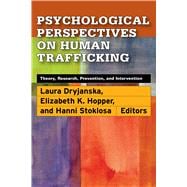
Note: Supplemental materials are not guaranteed with Rental or Used book purchases.
Purchase Benefits
What is included with this book?
Laura Dryjanksa, PhD, is an associate professor at Biola University in the Rosemead School of Psychology. Since 2009, she has been active on the Shadow Children Committee in Italy, which is dedicated to raising funds for shelters for "street children" in different countries and organizing conferences on this topic. In addition to publishing articles and book chapters on the topic of sex trafficking, objectification, and dehumanization, she has implemented a number of human trafficking awareness-raising initiatives at Biola University and in service organizations in Italy and Southern California. She has presented on the topic of human trafficking during scientific and advocacy-oriented events, including the European Association of Social Psychology meeting in Trento (Italy) in 2015, the APA Convention in Toronto in 2015, the APA Convention in Washington, DC. in 2017, the APA Convention in San Francisco in 2018, and APA Convention in San Diego in 2020, as well as networked with other scientists and activists during the Freedom from Slavery Forum in Palo Alto in 2017 and regular meetings of the Orange Country Human Trafficking Task Force. She has developed two courses on human trafficking for psychology undergraduate and graduate students, as well as an online lifelong learning course.
Hanni Stoklosa, MD, MPH, is the founding CEO of HEAL Trafficking and an emergency physician at Brigham and Women's Hospital (BWH) with appointments at Harvard Medical School and the Harvard Humanitarian Initiative. Dr. Stoklosa is an internationally recognized expert, advocate, researcher, and speaker on the wellbeing of trafficking survivors in the United States and internationally, using a public health lens. She has advised the United Nations, International Organization for Migration, U.S. Department of Health and Human Services, U.S. Department of Labor, U.S. Department of State, and the National Academy of Medicine on issues of human trafficking and has testified as an expert witness multiple times before the U.S. Congress. Moreover, she has conducted research on trafficking and persons facing the most significant social, economic, and health challenges in a diversity of settings including Australia, China, Egypt, Guatemala, India, Liberia, Nepal, Kazakhstan, the Philippines, South Sudan, Taiwan, and Thailand. Among other accolades, Dr. Stoklosa has been honored with the U.S. Department of Health and Human Services Office of Women's Health Emerging Leader award, the Harvard Medical School Dean's Faculty Community Service award, has been named as an Aspen Health Innovator and National Academy of Medicine Emerging Leader. Her anti-trafficking work has been featured by CNN, The New York Times, National Public Radio, Fortune, Glamour, Canadian Broadcasting Corporation, STAT News, and Marketplace. Dr. Stoklosa published the first textbook addressing the public health response to trafficking, Human Trafficking Is a Public Health Issue, A Paradigm Expansion in the United States.
Elizabeth K. Hopper, PhD, is a licensed clinical psychologist who specializes in traumatic stress and human trafficking. She is co-director of the National Center on Child Trafficking (NCCT) and previously led a national T/TA and mental health program for trafficking survivors and a New England regional anti-trafficking coalition. Dr. Hopper has written numerous scholarly articles, chapters, and books on complex trauma and trauma treatment, including coauthoring “Treating Adult Survivors of Childhood Emotional Abuse and Neglect: Component-Based Psychotherapy” and “Overcoming Trauma through Yoga.” Her research and practice interests focus on developmental trauma impacts, trauma-informed systems, and integrative models of healing.
Introduction: Toward the Psychological Definition of Human Trafficking
Laura Dryjanska, Elizabeth Hopper, and Hanni Stoklosa
Chapter 1. Human Trafficking Prevention: Using a Socioecological Framework to Moderate Risk and Promote Protective Factors
Elizabeth K. Hopper
Chapter 2. Exploring Human Trafficking of Marginalized Communities Through the Lens of Liberation Psychology
Thema Bryant and Dominique A. Malebranche
Chapter 3. Labor Trafficking: A Mental Health Perspective
Lujain Alhajji, JoNell Efantis Potter, and Vanessa Padilla
Chapter 4. Developmental Approaches to Child Trafficking
Cassandra Ma
Chapter 5. Psychologists as Vital Frame Sponsors in News Coverage of Human Trafficking
Barbara G. Friedman
Chapter 6. Social Psychology of Human Trafficking
Laura Dryjanska
Chapter 7. Industrial and Organizational Psychology and Human Trafficking: Harnessing the Potential for Proactivity, Prediction, and Prevention
Maura J. Mills, Leanne M. Tortez, Robert Blanton, Burcu B. Keskin, Gregory J. Bott, and Nickolas K. Freeman
Chapter 8. Psychological Impacts of Labor and Sex Trafficking
Elizabeth K. Hopper and Kelly Kinnish
Chapter 9. Trauma-Informed Intervention with Survivors of Human Trafficking
Kelly Kinnish and Elizabeth K. Hopper
Chapter 10. Using A Positive Psychology Framework to Empower Survivors of Human Trafficking
Becca C. Johnson and Jessa Crisp
Chapter 11. A Multidisciplinary Collaborative Approach to Human Trafficking
Jessica Wozniak and Deidre Hussey
The New copy of this book will include any supplemental materials advertised. Please check the title of the book to determine if it should include any access cards, study guides, lab manuals, CDs, etc.
The Used, Rental and eBook copies of this book are not guaranteed to include any supplemental materials. Typically, only the book itself is included. This is true even if the title states it includes any access cards, study guides, lab manuals, CDs, etc.